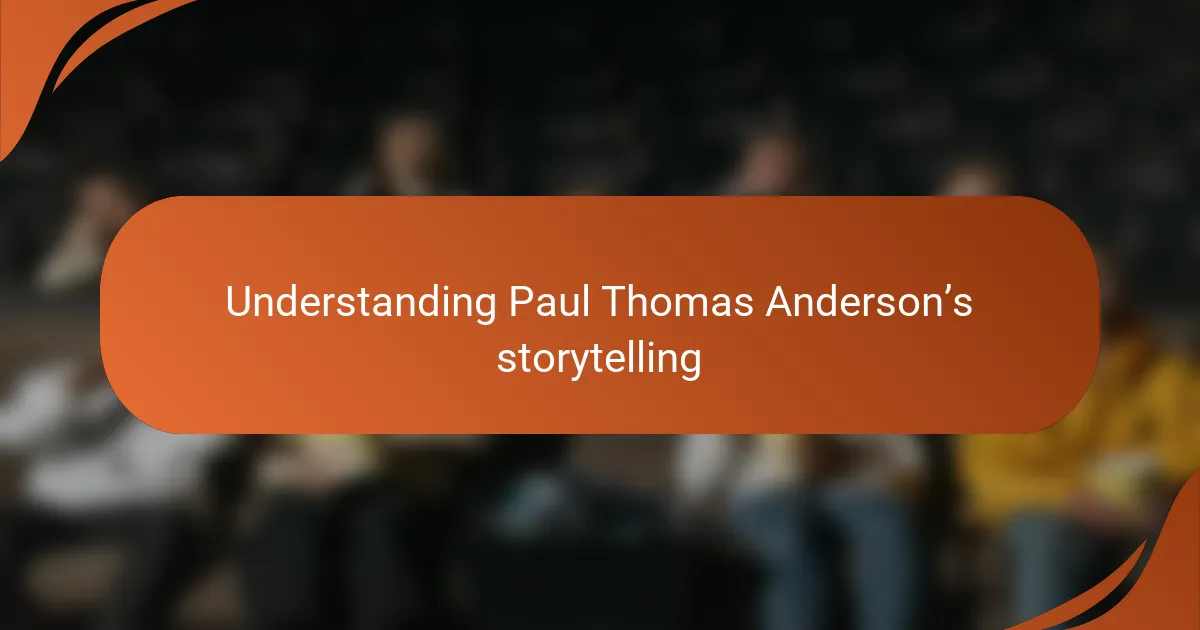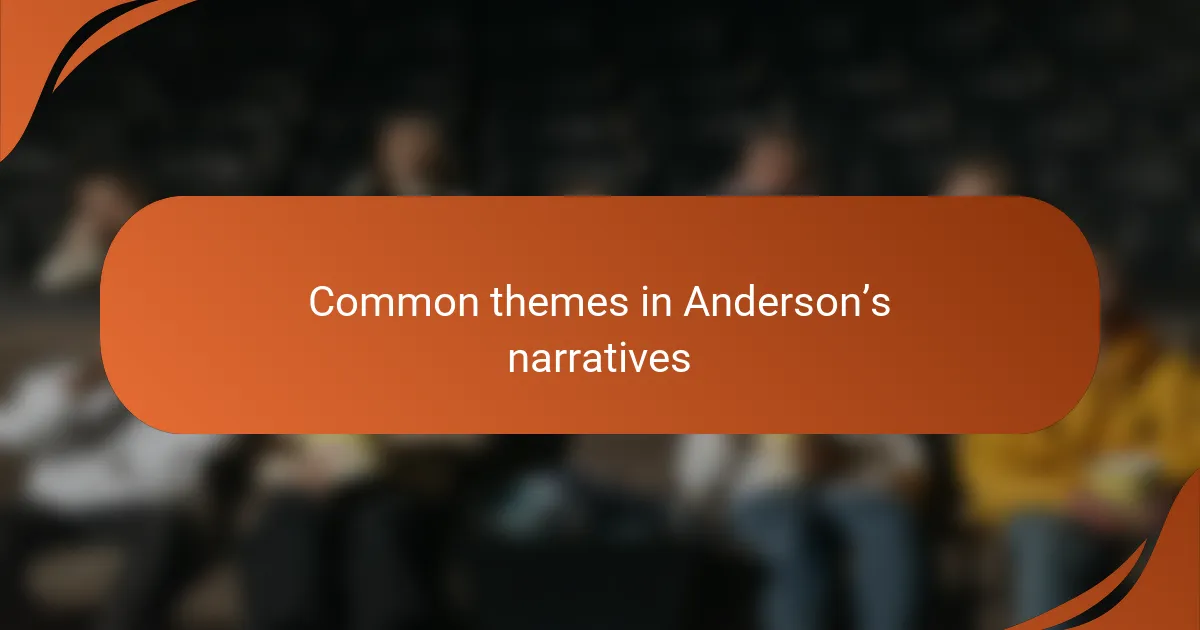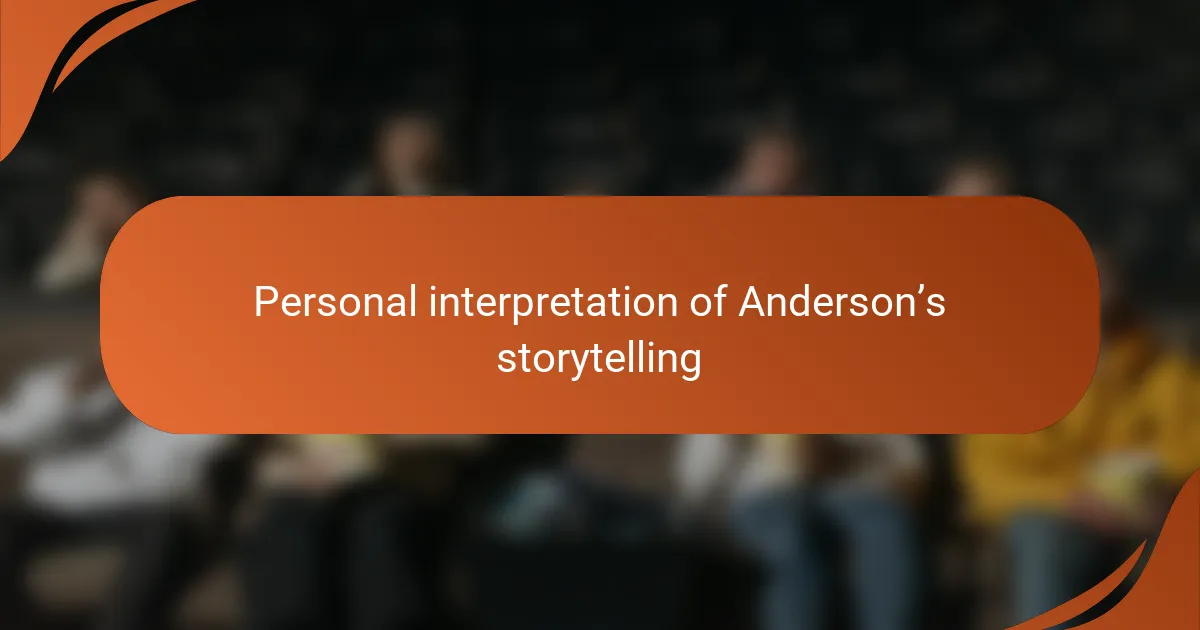Key takeaways
- Paul Thomas Anderson’s storytelling intricately blends character emotions with flawed lives, allowing narratives to unfold at a natural pace.
- His films often address complex themes like isolation, ambition, and family dynamics, inviting viewers to confront the tangled nature of real life.
- Anderson’s use of atmosphere, music, and memory enhances the emotional depth of his stories, encouraging personal connections with audiences.
- When writing reviews, it’s important to embrace complexity and focus on emotional impact, rather than just thematic analysis and technical aspects.

Understanding Paul Thomas Anderson’s storytelling
Paul Thomas Anderson’s storytelling always feels like stepping into a world that’s both intricate and deeply human. I often find myself caught in the way he layers characters’ emotions with their flawed, sometimes messy lives. It makes me wonder—how does he manage to make every subtle glance or silence carry so much weight?
What strikes me most is his patience with the narrative. Unlike many directors who rush, Anderson lets the story breathe, letting scenes unfold at their own pace. From my experience, this approach not only draws me closer to the characters but also creates a richer connection to their journeys.
I’ve noticed that his stories rarely offer easy answers, which can be challenging but wonderfully realistic. It’s like he’s inviting us to sit with uncertainty and complexity, rather than pushing us toward neat conclusions. Don’t you think that’s what true storytelling should do—reflect the tangled nature of real life?

Key elements in Anderson’s films
One thing that always stands out to me in Anderson’s films is his mastery of atmosphere. He uses music and cinematography not just as background tools but as powerful storytellers themselves. I remember watching “There Will Be Blood” and being completely absorbed by how every shot seemed to pulse with tension, making me feel like I was right there in the desert heat.
Another key element I see is his complex characters, who often don’t fit into clear categories of good or bad. From my perspective, this moral ambiguity brings a level of authenticity that’s rare in cinema today. Have you ever watched one of his movies and found yourself sympathizing with someone you initially disliked? That’s the kind of narrative depth he creates—characters who challenge our assumptions.
Finally, the way Anderson integrates time and memory fascinates me. He doesn’t rush through moments but lingers on them, almost making you live inside his characters’ recollections. This slow unfolding reminds me of real life, where understanding someone or something often comes gradually. Isn’t that what makes his stories linger long after the credits roll?

Common themes in Anderson’s narratives
What really draws me into Anderson’s narratives is how often themes of isolation and connection weave through his stories. It’s like he’s exploring the human need to relate, even when characters seem worlds apart or trapped in their own private struggles. Have you ever felt that bittersweet push and pull in his films, where loneliness and intimacy exist side by side?
Another thread that caught my attention is the way ambition shapes his characters’ lives, sometimes driving them to greatness, other times to ruin. Watching “There Will Be Blood,” I felt the tension of that relentless pursuit—how ambition can consume a person almost destructively. It makes me wonder: is Anderson showing us ambition as a double-edged sword, a force that can both create and destroy?
I also notice a fascination with family dynamics in his work. These relationships are rarely simple; they’re tangled with love, resentment, and longing. It reminds me of my own family moments—complicated but deeply formative. Isn’t it compelling how Anderson doesn’t sugarcoat these bonds but lets their flaws breathe and resonate?

BBC UK movie review standards
When I think about BBC UK movie review standards, what stands out is their commitment to thoroughness and fairness. Reviews don’t just summarize plots; they dive deep into the filmmaking craft—making sure every element, from script to cinematography, is thoughtfully considered. This rigorous approach has shaped how I expect reviews to balance insight with accessibility.
I’ve always appreciated how these standards encourage critics to bring their own voice and perspective while maintaining professionalism. It makes me trust their opinions because I sense both expertise and genuine reflection behind each review. Don’t you find it refreshing when a critic writes as if they’re sharing their personal encounter with the film, rather than just ticking boxes?
There’s also a strong emphasis on clarity and respect for the audience’s intelligence. The language used is clear, avoiding unnecessary jargon, which helps me grasp complex ideas without feeling overwhelmed. I believe this balance is key—it invites readers like me to think critically about movies, enhancing rather than complicating the viewing experience.

Comparing BBC reviews with personal views
I often find that BBC reviews capture the technical brilliance of Anderson’s films with impressive clarity, but my own experience tends to dwell more on the emotional currents beneath the surface. Their critiques highlight the craftsmanship, yet I sometimes wish they lingered longer on the personal impact those quiet moments have on me. Have you ever noticed how a review can praise a scene’s composition but miss that feeling of unease or wonder it stirred inside you?
From what I’ve read in BBC reviews, there’s a strong focus on narrative structure and thematic coherence, which I admire. Still, my perspective leans more toward how those themes affect me personally—how isolation or ambition in Anderson’s stories echo parts of my own life. It makes me wonder: can a review fully capture the layers of meaning that unfold uniquely for each viewer?
That said, BBC’s fairness and respect for diverse viewpoints resonate deeply with me. Their reviews never seem to impose a single “correct” way to interpret a film, which aligns with how I engage with Anderson’s storytelling—open to ambiguity and multiple readings. Isn’t that openness what truly enriches our conversation about movies?

Personal interpretation of Anderson’s storytelling
What I find most captivating about Anderson’s storytelling is how it feels like a conversation rather than a lecture. His films invite me to sit with uncertainty, to puzzle over characters’ motivations and contradictions in a way that mirrors real-life conversations. Have you ever felt that subtle invitation to think, rather than being handed a neat explanation?
Sometimes, I catch myself recalling a particular scene long after watching, not because of spectacular action, but because of a fleeting look or a pause that seemed to reveal volumes. It’s these quiet moments in Anderson’s stories that resonate with me personally, making the experience feel intimate and profoundly human. Don’t you think that’s the mark of storytelling that truly reaches beneath the surface?
Anderson’s approach pushes me to embrace ambiguity instead of fearing it. His narratives don’t tie up every loose end, which can be frustrating yet oddly comforting—like life itself, full of open questions and unresolved tensions. I wonder, does this willingness to dwell in complexity make his stories more honest, or does it simply challenge us to be more patient viewers?

Applying storytelling insights in reviews
When I apply storytelling insights from Anderson’s work to writing reviews, I try to slow down and savor the details instead of rushing to judgment. It helps me capture not just what happens on screen, but how it feels to live inside those moments. Have you ever noticed how a review can gain depth by focusing on the pauses and silences rather than just the plot points?
I’ve also learned to embrace complexity in my critiques—resisting the urge to offer tidy conclusions. Anderson’s narratives taught me that sometimes the most powerful stories are those left partly unresolved, inviting the audience to wrestle with ambiguity. In my reviews, I try to reflect that openness, encouraging readers to find their own meaning rather than prescribing one.
Above all, applying these insights makes me more attentive to the emotional rhythms beneath the technical achievements. While it’s important to analyze cinematography and script, I believe sharing how a film moves me personally creates a richer dialogue with readers. Isn’t that what good movie criticism should do—connect us through shared human experience as much as craft?